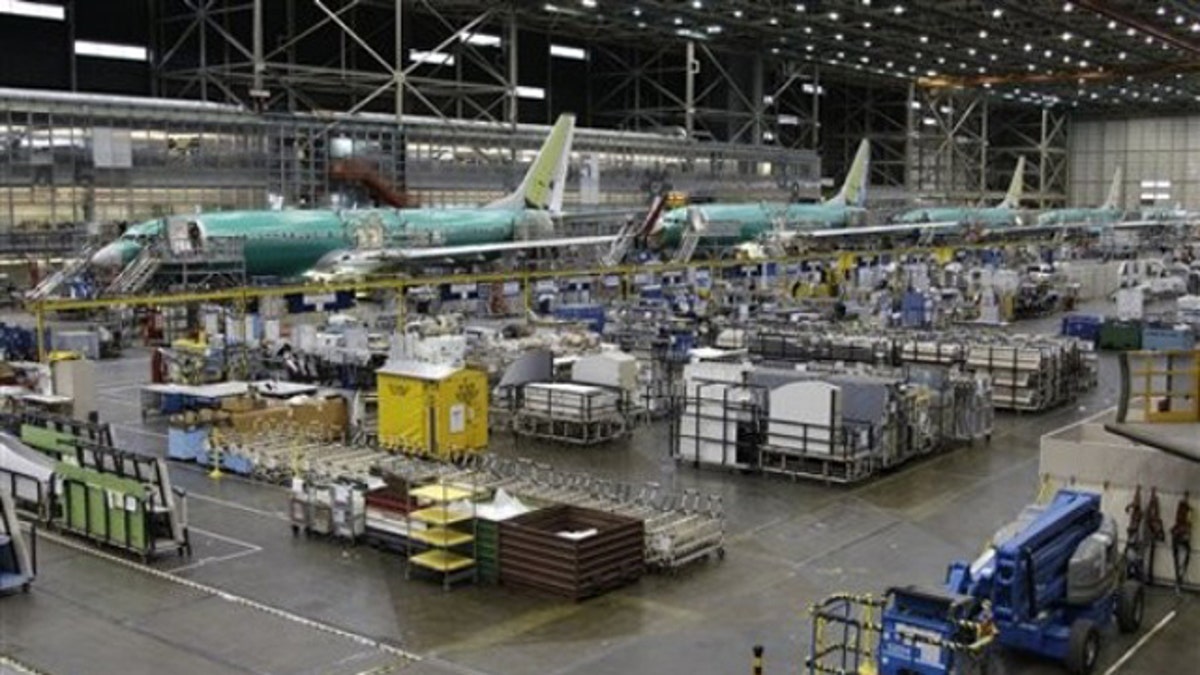
Boeing Co. 737 airplanes are shown at the company's assembly facility in Renton, Wash., on Oct. 26. Boeing is the kind of company that could be affected by a new rule regarding foreign workers. (AP)
Barraged by concerns from panicked employers, the top federal immigration office has postponed a new rule that would require businesses to certify they're not improperly sharing sensitive information with foreign workers.
If the regulation sounds obscure, that's because it is. But that's the problem. The new requirement, unveiled as part of a revised immigration form in November, caught some business owners by surprise, as they scrambled to figure out what the rule applied to and how to make sure they didn't go to jail by inadvertently violating it.
"These are very detailed regulations," said Curt Dombek, a Los Angeles-based attorney who specializes in international trade and has been helping clients adjust to the new standards.
U.S. Citizenship and Immigration Services, in pushing the new requirement, is effectively trying to enforce a law that's been on the books for years. Under the "export control" law, employers are prohibited from sharing certain technological data with foreign workers they bring on board without a license from the federal government. It's not a literal export of, say, automobiles or raw sugar. But the government considers it an export all the same, since a foreign worker could look at blueprints or some other technical plan in the United States and then "export" it to his or her country by simply returning home and replicating it.
Though the law is old, what's new is a USCIS requirement that businesses affirm, under penalty of perjury, that they're following the law. The new requirement was supposed to go into effect at the end of December, but the USCIS last week gave employers a two-month grace period -- they now have until Feb. 20 to comply.
Dombek said he ultimately expects most businesses to be able to meet the new deadline. But he said the USCIS, which acknowledged having received "several inquiries," probably got hit with "frantic phone calls from companies."
Software companies, aerospace companies and other high-tech firms could easily fall under the regulations -- pretty much anybody in the manufacturing and engineering industries. An employer failing to follow them could face fines or imprisonment.
Dombek, who deals directly with export control issues, said Fortune 500 companies with robust compliance units probably won't have any problem. They'll be able to navigate the complex rules which treat workers from some countries, like China, different from workers from other countries, like India.
Rather, he said the concerns are coming out of two areas -- smaller companies that may be affected but haven't bothered to check their compliance before, and companies that will almost certainly be unaffected but don't realize it and are scrambling to learn the new rules. He said he's had calls come in from the financial industry, for instance, asking "What is this?" though banks are probably in the clear.
Brian Graham, a Texas-based immigration attorney who also specializes in export compliance, said the reaction to the rule "tells me, boy, there must have been a lot of people who had no idea."
But Graham called the new regulation a good idea. He even expressed concern that the government was, given the recent delay, waiting a total of 90 days to implement that standard. He said seemingly innocuous information could be used for military purposes by a foreign country.
"Now that we know we have this requirement, we're giving a broader window of time for someone to apply without having to worry about it," he said. "What's going to happen with those petitions?"
He said the fact that the Department of Homeland Security was not already requiring employers to certify their compliance was a "gaping hole" in national security.
The new rule will require employers to fill out a new section on their foreign worker applications stating that they either don't need a license or, if they do need one, will block the employee-in-waiting from any sensitive information until the license is obtained.
"It's a little surprising that it's taken this long to get it onto a form," Graham said.




